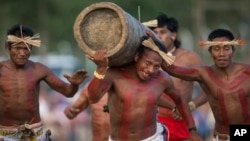A year after hosting the soccer World Cup and a year before staging the Summer Olympics, Brazil is set to stage a new international event: the Indigenous Peoples World Games.
The inaugural games will be held Sept. 18-27 in Palmas in the northern state of Tocantins.
"It's a very important moment for Brazil,'' Brazil's sports minister, George Hilton, told Reuters on Wednesday. "It's a time of exchanging knowledge and it's a good time to promote the indigenous peoples through the games.''
Hilton said 48 ethnicities would be represented among 4,000 athletes from 22 countries.
Brazil, home to nearly 900,000 indigenous peoples, who speak 274 languages, has held a dozen Indigenous Games for its own natives since 1996 and decided to expand the games into a truly international event.
The Brazilians are to make a presentation about the games at the United Nations on Friday to delegations that participate in the U.N. Permanent Forum on Indigenous Issues. A Canadian indigenous leader named Little Child will speak, Hilton said.
The sports to be contested will include rokra, a type of lacrosse that uses sticks and coconuts, and xikunahity, a variety of soccer in which only the head is used to move the ball.
"This event will be a cultural interchange among the tribes, and it's very important for all involved,'' Hilton said. "It's not only about the games, but they are also going to be showing their culture through food, through their art, and they are bringing their own interpreters so that one tribe can communicate with the other.''
Worldwide, it is estimated that there are 370 million indigenous peoples making up more than 5 percent of the world's population, according to the U.N.
Hilton said Peru, Mexico, Philippines and the United States were bidding to host the next Indigenous Peoples World Games, expected to be held in 2019.
The motto for September's games in Brazil is: "We are all Indigenous.''





